Research Advocates at ASCO 18: Insight from the ground
Although the 2018 American Society of Clinical Oncology Conference (ASCO 18) is now over, Fight Colorectal Cancer (Fight CRC) research advocates are still busy staying abreast of the current research in colorectal cancer. We decided to ask Fight CRC research advocates who attended ASCO 18 to provide their perspectives on the conference and how the knowledge they gained by attending strengthened their role as research advocates.
Check out what a few advocates had to say about attending ASCO 18, and be sure to read our post ASCO blog for updates on the research!
Florence Kurttila, Stage IV Colon Cancer Survivor, Three-time ASCO attendee
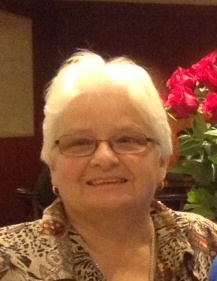
There were so many pieces of information I gathered at ASCO 18. One of the sessions that impressed me the most was titled “Patient-Clinician Communication is a two-way street: Driving in Parallel towards well-being.” The speakers drove home the need for patients/caregivers and the medical team to communicate and make joint decisions to be effective in providing care and treatment. When patients are educated and ask questions, it makes things more understandable and thus, they become partners in care.
Another area that was of great interest to patients was the discussion about CancerLinQ, a health information technology platform developed by ASCO. Privacy, precautions, accessibility to researchers and physicians are all areas included in CancerLinQ and it is such an exceptional database of education and knowledge to help treat patients. Research and communication has grown and will continue to grow even more with new treatments, new drugs and therapies.
Financial toxicity was addressed in multiple sessions as well. How does a patient pay for their care? What are patients willing or unwilling to give up just be be treated with state-of-the-art therapies? Is help available to live a quality of life? Is there help available for treatments that sometimes cost as much as $ 25,000 a month? We are still researching answers!
Wenora Johnson, Stage III Colon Cancer Survivor, Three-time ASCO attendee
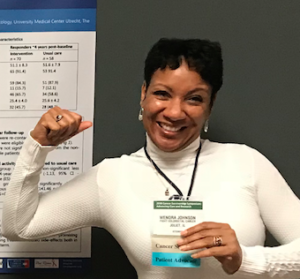
ASCO always reminds me of the vast number of scientists and doctors working hard on our behalf to help find better treatment options for cancer patients. Thousands attend and contribute their research and knowledge which helps me further understand my role as an advocate.
Knowledge I gained from ASCO included:
- How intensive research can result in objective outcomes. For example, three months of oxaliplatin-based chemotherapy may be just as effective as six months of oxaliplatin-based chemotherapy for colon cancer.
- Recognizing challenges of colorectal cancer clinical trial results – especially relating to toxicity of treatment and management approaches to immune-checkpoint inhibitor toxicity rates
I also enjoyed visiting the poster presentation “Increasing access to NGS tests for women and racial minorities to lift barriers to molecular driven clinical trial enrolment.” This research identified the importance of minority recruitment and explored how to erase fears in minority communities in clinical trials.
Additionally, the Fight CRC Immunotherapy Workgroup meeting with HalioDx discussed Immunoscore and the capacity to integrate these types of assays into clinical trials. This meeting also explored how advocates can have a seat at the table for discussion when thinking about how to move the state of the science forward in immunotherapy research.
Lera Chitwood, Caregiver, First-time ASCO attendee
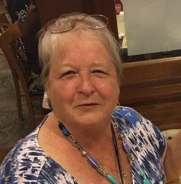 Before attending ASCO, I was anxious about understanding the verbal content and visual data. Understanding colon cancer has become more complicated as research knowledge develops, however I found that my own knowledge is increasing. Where I recognized names of biomarkers, mutations, cancer drugs, and immunotherapy terminology before the conference; was gaining more understanding of the process of cancer pathways and how new treatment methods were attacking cancer cells as well as building up the immune system to knock out the cancerous proliferation.
Before attending ASCO, I was anxious about understanding the verbal content and visual data. Understanding colon cancer has become more complicated as research knowledge develops, however I found that my own knowledge is increasing. Where I recognized names of biomarkers, mutations, cancer drugs, and immunotherapy terminology before the conference; was gaining more understanding of the process of cancer pathways and how new treatment methods were attacking cancer cells as well as building up the immune system to knock out the cancerous proliferation.
The following are some of my perceptions:
- Biomarker testing is essential prior to treatment, particularly to identify MSS and MSI -H tumor types.
- Testing at younger ages is necessary due to the continuing increase of cancer in young adults that is not diagnosed until late stages. I feel more attention needs to be focused on early-onset CRC at all conferences.
Did you see the new ACS guidelines which recommend lowering the screening age for average risk populations from age 50 to 45?
- Patient advocates are becoming a valued part of the treatment process, evidenced by the number of advocates attending ASCO, the FDA patient advocate meetings, and comments from doctors and researchers stopping by our Fight CRC booth.
- There is no generic colon cancer. Cancer is not organ specific. Cancer in the colon is determined by its specific molecular coding.
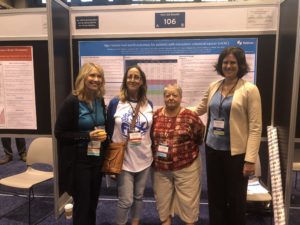
Karen Wehling, Stage IV Rectal Cancer Survivor, Three-time attendee at ASCO
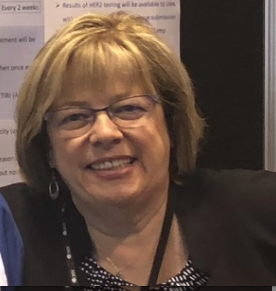 This year at ASCO, I learned about a blood test being developed by HalioDx to assess immunoscore. I attended a presentation about predicting outcomes for CRC using this blood test and met the head of the company. On the last day of ASCO during the Fight CRC IO workgroup meeting, I engaged with researchers from the United States and France as we discussed the possible usefulness of these types of tests for treating CRC patients in the US, especially stage II and stage III survivors.
This year at ASCO, I learned about a blood test being developed by HalioDx to assess immunoscore. I attended a presentation about predicting outcomes for CRC using this blood test and met the head of the company. On the last day of ASCO during the Fight CRC IO workgroup meeting, I engaged with researchers from the United States and France as we discussed the possible usefulness of these types of tests for treating CRC patients in the US, especially stage II and stage III survivors.
One of the highlights for me during ASCO was being able to meet with our group of Fight CRC research advocates and Fight CRC’s Research Advocacy Manager, Reese Garcia to review some of the posters presentations at ASCO. We were able to discuss the posters and ask researchers questions.
An abstract with potential significant implications that the GI Oncologists were highly anticipating was presented during the Oral Abstract discussion on the last day. Results from a European Clinical Trial looking at HIPEC (Hyperthermic Intraperitoneal Chemotherapy), a procedure used for Stage IV CRC with metastases to the abdominal cavity, indicated that HIPEC used with oxaliplatin did not change overall survival, and HIPEC added more postoperative complications.
There is so much promising research to bring back to the rest of the CRC community. One of the most important messages that the cancer patient community needs to know is to to have HOPE… there are incredibly smart, dedicated researchers… 40-50,000 of them from all over the world, working hard to put themselves out of business trying to find better and better treatments for cancer.
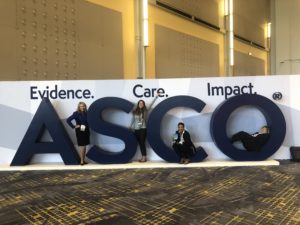
Fight CRC research advocates are the most educated patient advocates in the research world. Not only do they attend conferences like ASCO, but they push the envelope, reach out to researchers and engage in the science. They are changing the direction of colorectal cancer one step at a time. Fight CRC will continue to invest in research advocacy because it is vital to progressing the science, resulting in the best outcomes possible for CRC survivors.
Didn’t catch our post ASCO recap webinar with Dr. Goldberg this past week? Be sure to watch the recording here!
Follow @FightCRC on twitter for all of the latest research updates!
The post Research Advocates at ASCO 18: Insight from the ground appeared first on Fight Colorectal Cancer.
Fight Colorectal Cancer
Comments
Post a Comment